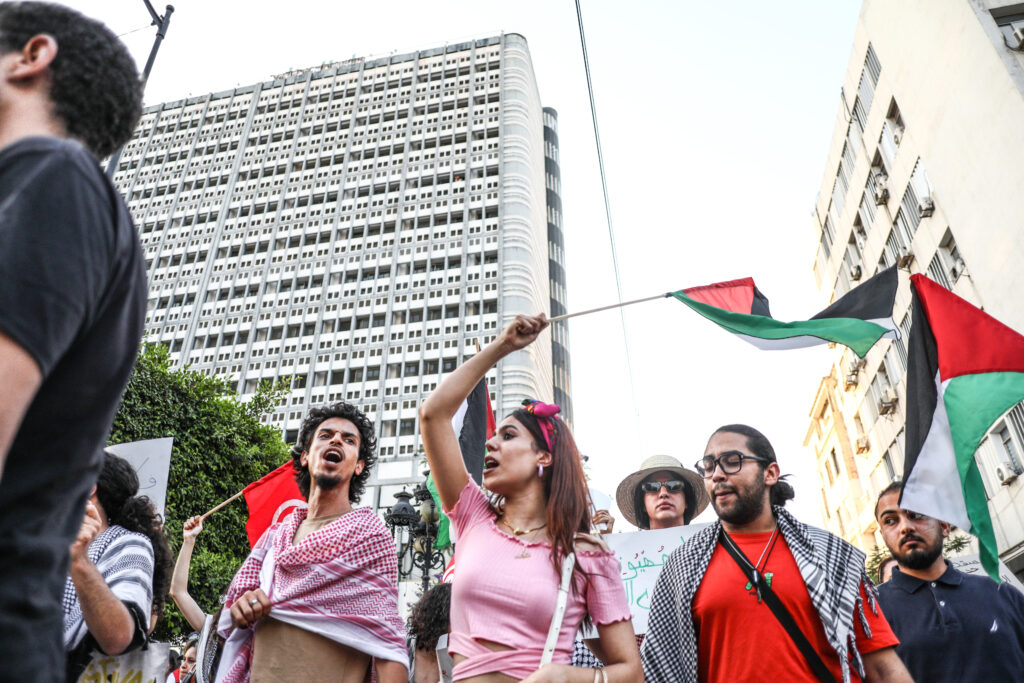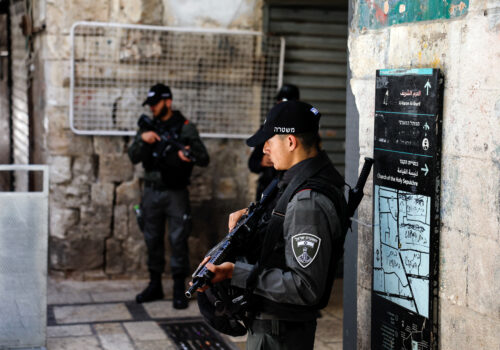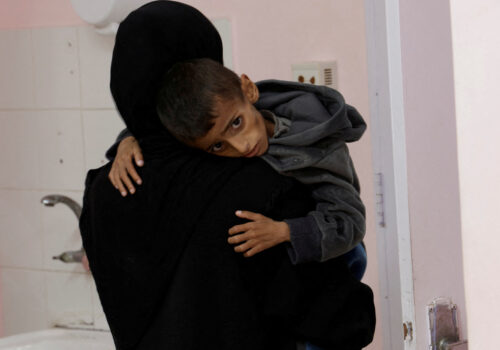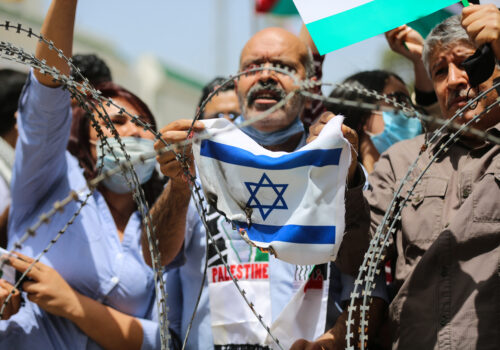The Egyptian government was wary and on edge last week after a land convoy of at least 1,500 pro-Palestinian activists and more than one hundred vehicles crossed into Libya from Tunisia on June 10 en route to war-torn Gaza. The caravan was meant to pile pressure on Israel to lift its aid blockade on the besieged enclave, and to draw attention to the worsening humanitarian crisis there.
In recent days, scores of pro-Palestinian activists—including a group of forty Algerians and two French nationals—were reportedly barred from entry into Egypt and deported shortly after their arrival at Cairo International Airport despite having obtained visas. Hundreds of other campaigners planning to participate in the march were attacked on June 14 near a checkpoint in the north-eastern city of Ismailia, where they had gathered to wait for a nod of approval from the authorities to travel on to el-Arish. The area between el-Arish and Rafah is classified as a military zone and remains off limits to travelers without prior security permits.
Cairo’s moves to deter the march to Gaza are baffling to many because the international initiative expressing solidarity with Gaza is in line with Egypt’s declared position on Gaza. So why is Cairo resorting to excessive measures to nip the movement in the bud?
An international activist coalition
Organizers, comprising a blend of regional volunteers and international groups against Israeli occupation, said they were taking matters into their own hands “because Arab governments haven’t pushed enough” to end the war between Israel and Hamas.
The regional-based “Soumoud” (Steadfastness or Resilience in Arabic) Caravan—comprising volunteers from Tunisia, Algeria, Morocco, Mauritania, and Libya—was supported by various Tunisian civil society groups and rights organizations, including the Tunisian Labor Union and National Bar Association. The activists who started their protest journey in Tunis on June 9, had been planning to travel along the Libyan coast and cross into Egypt though the country’s northwestern Saloum border, before trekking the Sinai to el-Arish to join other international activists on a Global March to the Rafah border crossing—a major entry point into southern Gaza where a sit-in had been planned June 15 to 19.
SIGN UP FOR THIS WEEK IN THE MIDEAST NEWSLETTER
The second international march, organized by the Global Coalition Against the Occupation of Palestine—a coalition of rights groups, trade unions, and solidarity movements from over thirty-two countries—mobilized thousands of rights campaigners from more than fifty countries to participate in the rally.
More than 55,000 Palestinians have been killed since the start of Israel’s war on Gaza following the October 7, 2023, Hamas attacks, and much of the enclave’s 2.1 million people have faced the threat of famine under Israel’s suffocating blockade. Israel says it is blocking aid to put pressure on Hamas to release the remaining hostages still held in Gaza.
A statement released by the Egyptian Foreign Ministry on June 11 welcomed foreign delegations but cautioned that anyone traveling to Sinai must obtain prior government permission and comply with Gaza border regulations.
Organizers of the Steadfastness Convoy, meanwhile, said they had met with the Egyptian ambassador in Tunis prior to their departure to coordinate their entry into the country but had since received no word from the embassy. This was despite also sending an official letter to the embassy requesting support from the Egyptian authorities for their mission.
But Cairo was skeptical and made it clear that it opposed the march.
Egyptian opposition
Cairo does not wish to provoke the ire of the Israeli government, which has made clear it is opposed to any mass mobilization at Rafah. If the Egyptian leadership had given the march the green light to proceed, the move would have certainly escalated tensions between Egypt and Israel, and subsequently, between Cairo and Washington. Worse still, it may have caused instability at the border if Israel had attacked the march.
Israel Katz, Israel’s defense minister, made his country’s position clear when he publicly called on Egypt to block the Steadfastness Convoy. Katz said, “I expect the Egyptian authorities to prevent the arrival of Jihadist protesters at the Egypt-Israel border and not to allow them to carry out provocations or attempt to enter Gaza.”
However, there are also internal factors behind Cairo’s decision, foremost among them being the authorities’ fear of Egyptian protesters joining the foreign participants. Many Egyptians watching the scenes of bloodshed from Gaza over the past twenty-one months are ashamed of their own helplessness and their government’s failure to stop the war. Their frustration and despair could spark a new wave of unrest that may prove difficult to contain.
The Egyptian government has cracked down on protests of any kind, criminalizing demonstrations held without prior authorization from the interior ministry. At a time of rising domestic discontent over soaring prices of food, fuel, and basic commodities, the authorities fear any mass mobilization, as protesters may end up directing their anger at the government, prompting renewed turmoil and political instability.
Cairo did, however, allow a rare but small pro-Palestinian protest to be held outside the Journalists Syndicate on June 12, possibly to allow pro-Palestinian activists to let off steam. Alternatively, the rally could have been a test balloon by the government to gauge the level of public anger over the Gaza war. Mahienour el-Masry, a rights lawyer who took part in the rally, said the protesters called on the government to allow the solidarity convoys to travel to the Rafah border crossing; they also called for the crossing to be opened to allow aid to enter Gaza.
Some government loyalists in the media painted the solidarity convoys as a ploy meant to embarrass Egypt and implement Israel and Washington’s plan of displacing Palestinians. They questioned why the activists had chosen to travel to Gaza via Egyptian land instead of sea. Others warned that the convoys are a threat to Egypt’s national security. The convoys also stirred controversy on social media with some internet users suggesting that Islamists organized the Steadfastness caravan in a bid to sow dissent in Egypt, and others shared videos of some of the convoy’s participants lambasting the Egyptian president for not allowing the convoys to pass through.
Major General Samir Farag, a military strategist and former Head of the Armed Forces Morale Affairs Department, told me that some of the activists had obtained tourist visas prior to their arrival in Egypt but had not disclosed their plan to participate in the march to Gaza.
Farag said, “Egypt has enough internal problems; we don’t need more challenges. We don’t know who these activists are or what they are bringing into the country. The march should have been coordinated with the authorities beforehand.”
While the convoy’s passage through Western Libya has been smooth, traversing eastern Libya—which is under the command of General Khalifa Haftar—proved more challenging. On June 12, Haftar’s security forces stopped the caravan in Sirte, demanding additional security clearances before it was allowed passage to Benghazi. Phone lines and internet services were cut off in the area, leaving the protesters incommunicado. The moves were likely at Cairo’s behest—Egypt has been a staunch supporter of Haftar, who shares Cairo’s anti-Islamist stance.
Yasmine Hamrouni, a spokesperson for the Steadfastness Caravan, finally returned my calls on June 17. She told me that the activists had decided to return to Tunisia after it became clear they would not be granted access to Benghazi or Egypt. Both the Libyan National Army and the Egyptian authorities had joined forces to block the march to Rafah.
Even if the marchers had gotten clearance from the Egyptian authorities, the Israeli Defense Forces would have likely thwarted their efforts. Eight of the twelve activists who were on board the Madeleine Freedom Flotilla, which had also attempted to break the siege on Gaza, remain in detention in Israel, their fate uncertain. Israel deported the remaining four activists.
Like the Freedom Flotilla, the Global March too has been stopped in its tracks. Both attempts, however, signal that international pressure is mounting on Israel to break its blockade on Gaza, described by United Nations spokesperson, Jens Laerke, as “the hungriest place on earth.”
Whether or not Israel will bow to international pressure and alleviate the widespread shortages of food, fuel, and basic commodities will largely depend on neighboring countries, especially Egypt’s willingness to cooperate with international rights campaigners. For now, it appears that the Egyptian leadership is not taking any chances and will not hesitate to resort to violence to block “any attempts to destabilize the country.”
As Farag insisted to me: “Egypt’s security comes first.”
Shahira Amin is a nonresident senior fellow at the Atlantic Council’s Scowcroft Middle East Security Initiative, focusing on Egypt, economics, energy, water access, and women’s issues.
Further reading
Wed, Jun 18, 2025
Dispatch from Jerusalem: Inside Israel’s bunkers as Iran war erupts
MENASource By Sarah Zaaimi
The stakes are higher as two opposing rhetorics about the region's future are at play: Pan-Abrahamism and Revolutionary Islamism.
Mon, May 12, 2025
Gazans fear famine amid Israel aid block: ‘I don’t want to be a number’
MENASource By Arwa Damon
For Palestinians, time is running out— a warning that has been echoed at some of the highest ranks of international organizations, including the World Health Organization.
Tue, Jun 3, 2025
Beyond the gridlock: The case for Tunisia-Israel normalization
MENASource By
The potential for normalization may seem farfetched, but there are many strategic benefits for Tunisia and Israel beyond what meets the eye.
Image: A young pro-Palestinian woman waves the Palestinian flag while shouting slogans during a march organized by civil society, feminist, and human rights organizations, including Amnesty International and the Tunisian League of Human Rights (LTDH), in Tunis, Tunisia, on June 15, 2025. The march brings together dozens of pro-Palestinian demonstrators in support of the international movements, the Global March to Gaza and the Maghreb Resilience Convoy. These humanitarian movements aim to head towards the Rafah border crossing in Egypt to lift the blockade of Gaza amid Israel's ongoing war in the enclave. Demonstrators also call for the criminalization of all normalization of relations with Israel while expressing support for the Palestinian resistance. The Global March to Gaza is a civilian-led international initiative, scheduled to begin on June 15, 2025, aiming to march from Arish, Egypt, to the Rafah border crossing with the Gaza Strip in Palestine. Two days earlier, hundreds of participants in the Global March to Gaza arriving in Cairo have their passports taken at a checkpoint and are detained and deported to their home countries in Europe and North Africa. (Photo by Chedly Ben Ibrahim/NurPhoto)NO USE FRANCE




